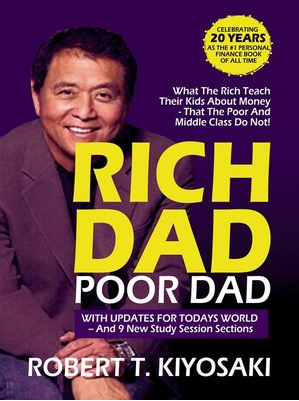
In this book, Robert Kiyosaki had two dads, one rich and one poor. Both provided life lessons as reflected by his account of each man’s character and experience. One was a fearful loser and died owing money. The other was a bold winner and died leaving money to charities and his family. Their opposite attitudes – loser/winner; small timer/major leaguer; scaredy-cat/big bad wolf – provides the narrative horse that Kiyosaki rides.
Rich Dad, Poor Dad is a fable since Rich Dad doesn't really exist. Kiyosaki describes himself at different ages and presents what he claims are word-for-word versions of the at-first baffling – then later, profound – teaching moments both fathers provided. The rich dad talked in riddles. The young Kiyosaki found this perplexing until – after he made financial mistakes that led him to his true course in life – a blinding flash of revelation revealed his rich father’s purpose. This narrative method conveys each lesson, but it gets old really fast.
Kiyosaki, fills pages with perfect fluff. For instance, he recounts the story of his early misunderstanding of the phrase “making money.” The story neither rings true nor justifies the space Kiyosaki spends on it. But that’s the author’s gift: He’s a hokey but likable storyteller, and he pads his advice like a mattress. However, Kiyosaki is not a repeat bestseller for nothing. His prose rips along, all short simple sentences and rhythmic punch lines. He writes page-turners.
Once he finally sets aside his pervasive, somewhat grating two dads device, Kiyosaki delivers straightforward, worthwhile financial and life advice. He doesn’t write for investment bankers or at-home high-speed traders. He writes for low-income or middle-class workers trying to understand the complexity of their finances and of potential investments.
In these instances, Kiyosaki does not speak in parables. He details what you should do with your money and why. He teaches you to embrace a new, empowered mind-set. He wants you to regard your money as a tool, whether you have a lot or a little.
Kiyosaki capably teaches basic, necessary principles. For example, he urges you to buy assets, whatever they are, however small. If can purchase an asset that might grow in value, get it. Don’t buy a new TV or a car, and don’t buy a new suit or expensive dinner, he insists. Take that money, find something that you know will gain in value and acquire it before you spend your hard-earned coin on something that will not appreciate.